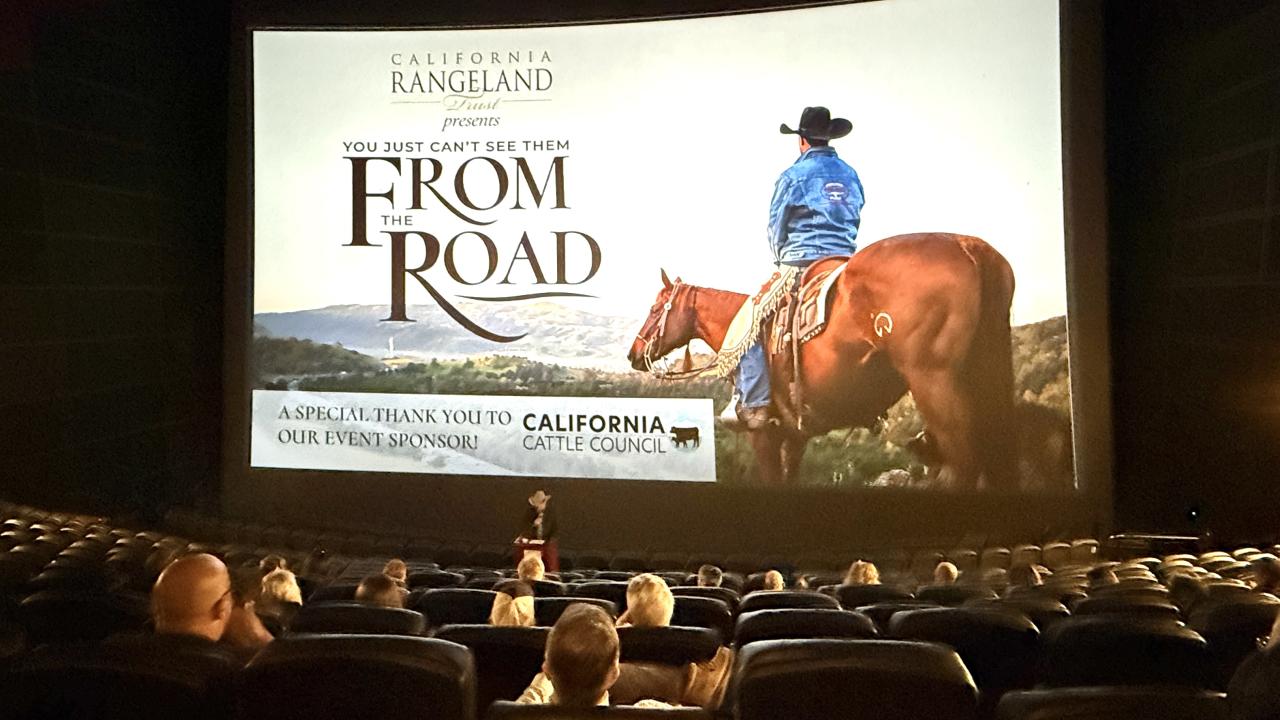
Documentary Showcases California Ranchers Trying to Preserve Their Land and Heritage
California’s legendary rangelands, once the heart of the American West, are vanishing at an alarming rate. Driven by factors such as economic pressures, regulatory challenges, and relentless urban sprawl, these iconic landscapes are under threat—putting the future of cattle ranching in jeopardy. A powerful new documentary shines a spotlight on the determined ranchers battling to save these crucial rangelands for generations to come.
California Rangeland Trust (CRT) recently premiered their award-winning film, “You Just Can’t See Them From the Road,” at the IMAX theater in downtown Sacramento, as part of the annual celebration of agriculture at the Ag Day at the Capitol event.
“So, we at the California Rangeland Trust are not in the filmmaking business. We're in the agricultural land conservation business, rangeland in particular,” CRT CEO Michael Delbar said. “But we've done some shorter videos in the past, and those were great, and they've told a little bit of the story, but they haven't told the whole story about what these ranchers are doing day in and day out for the benefit of everybody.”
Farmers, ranchers, industry leaders, and policymakers showed support for the documentary, including Karen Ross, secretary of the California Department of Food and Agriculture; Wade Crowfoot, secretary of the California Natural Resources Agency; and Shannon Douglass, president of the California Farm Bureau Federation. The three helped introduce the documentary and offered the audience a glimpse into the current struggles of California farmers and ranchers
“This movie highlights some of the other challenges we face in California in particular,” said CFBF President Shannon Douglass. “We face some of the highest regulatory costs in the country, and those are added pressures that are pushing these farms out. In the last 20 years we’ve lost 20% of California farms and that’s over 15,000 farms and so the work that is highlighted here today is really meaningful for all of California agriculture”
Filmed over the course of a year, the documentary highlighted several ranching operations in the state, including:
- The family-owned Hearst Ranch, which has raised cattle for more than 150 years on 150,000 acres of native grasslands in the shadow of Hearst Castle in San Simeon and Cholame
- The Elgorriagas, a multigenerational Basque-American family in Madera County facing the loss of their land and way of life
- The 270,000-acre Tejon Ranch, based in Lebec between Los Angeles and Bakersfield, one of the largest private landowners in California
- Kern County rancher Ernest Bufford, a retired California Highway Patrol officer and one of the state’s largest African American landowners
- The six-generation Koopmann Ranch, one of the few remaining ranches in the Bay Area, surrounded by urban expansion in Sunol in the East Bay.
Clayton Koopmann of Koopmann Ranch, a central figure in the film, discusses several key issues facing his family’s ranch, including the growing disconnect between ranchers and the general public.
At one point in the documentary, Koopmann comments, “If you ask people where their food comes from or where does your milk come from, their immediate answer is the grocery store, but there’s a lot more behind it.”
The title of the film takes on special significance for the Koopmann family because they own and operate a multigenerational 900-acre cow-calf operation in the Bay Area city of Sunol. The ranch is an agricultural oasis nestled in an urban jungle that is bordered by several housing developments, busy interstates and a golf course. The family has worked with CRT on easements, which have allowed the family to continue their work on the preservation of the land and other natural resources for the benefit of future generations. And as the movie title suggests, you can’t see their ranch from the road.
Clayton, who was at the screening in Sacramento, hopes that by putting his family’s story out there and humanizing the hard work they and fellow ranchers do every day, it will remind people of the dedication it takes to grow food and hopefully will aid in the sustainability of ranching in the state as well.
“I was really excited about the idea of being in the documentary because I think I'm in a position to be an advocate for this industry,” Clayton said. “Whatever I can do, I will do it because our family is a part of the rangelands in the state, and this is very important to us. Especially being in the Bay Area, we have an opportunity to reach a lot of people, and we've tried to be transparent and to share our story and I thought this was a good opportunity to get on a broader stage and to support the Rangeland Trust.”
The documentary was produced by California Rangeland Trust, which is a non-profit organization that was founded in 1998 by a group cattlemen and cattlewomen who all came together to protect the stewardship, natural resources, and open spaces of California’s ranches. All of which they continue to advocate for today.
“We're losing 2,000 acres a day across the country, and that's probably a conservative number,” Delbar said. “And by 2040, the estimate is in California we're going to lose almost 800,000 acres of farming ranch land. So, if we're going to have things like food security and wildlife habitat, as well as all the economic and environmental benefits our ranchers are providing, we have to step up and protect those lands.”
The movie also highlights the critical role that ranchers play in stewarding the land now, and for future generations.
"Ranchers and their grazing practices play a crucial role in sustainability,” said CLEAR Center Director Dr. Frank Mitloehner who attended the screening. “And by carefully managing the land, ranchers help preserve native plants and support wildlife habitats that thrive on the remaining open land that the state still has. Taking care of the land and water resources that they’ve been entrusted with is a critical pillar of sustainability and something that they relish doing.”
CDFA Secretary Ross echoed Dr. Mitloehner’s thoughts and added that, “When you see the land, you might not always see the people, but you should think about those people that are passionate about taking care of that land to make sure future generations will be able to be on that land. And they’re doing it in a way that provides so many benefits to all of us, besides great beef on the dinner table.”
The documentary has won several awards at film festivals across the country, including best feature film, and has received significant attention across the country and internationally as well.
“We've had an overwhelming positive reaction from folks that have watched the film,” said Alyssa Rolen, Communications Director for California Rangeland Trust, “They all love it. At every screening that we're at, they always tell us we need to provide tissues, because people get so emotional watching it and it brings tears to people's eyes and that tells me that we did something right in telling this story.”
California Rangeland Trust will continue screening the documentary throughout California and you can watch the trailer here.
